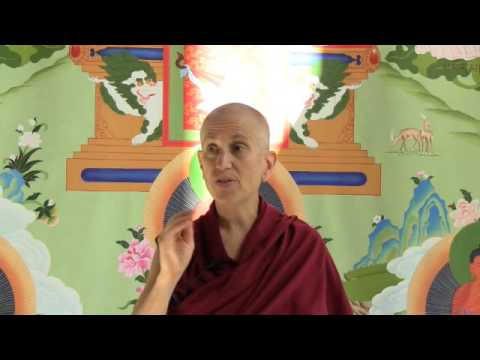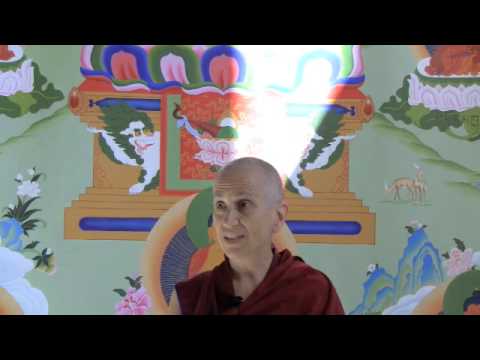The 10 non-virtues: 3 of mind
Stages of the Path #70
Part of a series of Bodhisattva’s Breakfast Corner talks on the Stages of the Path (or lamrim) as described in the Guru Puja text by Panchen Lama I Lobsang Chokyi Gyaltsen.
- The three mental non-virtues
- Coveting
- Ill will
- Wrong view
- Detecting the mental non-virtues
We’ve been talking about the ten non-virtues. We’ve gotten through the three physical ones, the four verbal ones. So then the three mental ones.
These ones we can commit mentally, we don’t have to say anything, we don’t have to do anything. And these three actually act as the things that bring about the seven physical and verbal ones. So, like our monastic vows, the five lay precepts, they all deal with physical and verbal actions. But if we want to abandon those negative actions and the seven of body and speech included in the ten destructive actions, then we have to work with the mind. And so that’s where these three mental non-virtues come in.
These three mental non-virtues are not karmas. They’re pathways to karma because they’ll take you on a path to another rebirth. And they’re not karma because karma is the mental factor of intention. So they’re not the mental factor of intention, but they’re another mental factor that is in the cluster of various mental factors associated with a mental consciousness.
- Coveting is under attachment, but it’s the increase of attachment. It’s not just one thought of attachment. It’s huge attachment.
- Ill will (malice) is, again, in the field of anger, and it’s anger when it’s really developed.
- Wrong views is in the field of ignorance, and it’s ignorance when it’s really developed.
So those three are afflictions, not karma. But when they’re in a mind—a primary mind with other mental factors—then they make that mental factor of intention in that primary mind negative. And that’s what creates the karma.
Coveting
Coveting is the greedy mind of attachment that says, “I want, I want, I want.” Or how we place it in America, “I need, I need, I need….” It can be for material things and wealth. It can be for relationships and sex. It can be for reputation and praise and popularity and status. It can be for anything. And you can see that if we have attachment in the mind and we don’t take care of it, and we ruminate on it, it becomes coveting. And then coveting then inspires us to do physical and verbal things to get what we want. Or to eliminate the hindrances to getting what we want.
So for example, coveting could transform into stealing. It could motivate stealing, where we’re taking stuff. Or it could motivate unwise sexual behavior. Or it could motivate even harsh words, because we want something so we’re going to bad-rap somebody else.
So that’s coveting.
Ill will (malice)
Then ill will (malice) is not just an angry thought, but it’s anger when it’s well developed, where you really are cultivating it with the intention to do something. So it could certainly motivate stealing, and killing, and creating disharmony, and harsh words, and all sorts of things.
Wrong views
And then wrong views. Here in this case, wrong views means the wrong views about the conventional reality. It’s not the wrong view about the ultimate nature, but it’s the wrong view (for example) that our actions don’t have any ethical dimensions. Or even if they have an ethical dimension, they don’t bring results. Or even if they bring results, the results aren’t concordant with the actual actions that are done. It can be wrong views such as there’s no Buddha, Dharma, Sangha. Something like this.
So here, wrong views is not doubt. It’s not doubt, it’s not curiosity, it’s not the mind that wants to investigate and learn. It’s a very stubborn wrong view that’s come about because of thinking of something in the wrong way and coming to the wrong conclusion ,and then stubbornly holding onto that view in a very closed-minded way so that you’re not open hearing anything else.
It’s said that the wrong view is actually the most dangerous because if we have wrong views about karma and its effects, then in our mind we give ourselves license to do the seven non-virtues that are verbal and physical. Because if we say, “Oh, our actions have no ethical dimension, well might as well go out and do this and that.” Somebody with wrong views—not everybody with wrong views does it, but some people could then justify their negative behavior.
His Holiness has also expanded the meaning of wrong views—because usually it’s in the sense of experiencing the results of your actions in future lives—but he says even if you’re living your life now and you think, “I can do something illegal because my actions won’t bring results.” So it’s the kind of mind that doesn’t think about the future results of our actions. And that mind gets us a lot of problems, doesn’t it? Because we just don’t think. And then we do something, and then we have to experience the result of the choices that we’ve made, even in this life. And it can bring a lot of messes in our lives.
So those are the three mental ones that we want to abandon for the sake of our own happiness and the well-being of others as well.
Mental non-virtues hard to catch
Those three are actually harder to catch. We have to be more astute to catch them. Because they’re just mental. And you could have a good meditation session on coveting. Very profound, single-pointed meditation on how to get the object of your attachment, and how much you’re going to enjoy it. Having this great daydream about it. You can have profound samadhi on ill will, thinking of exactly what you’re going to say, planning it with ill will to hurt somebody, to get your revenge for what they did to you. Perfect meditation position looking very holy …. [Laughter] So we have to be careful.
Venerable Thubten Chodron
Venerable Chodron emphasizes the practical application of Buddha’s teachings in our daily lives and is especially skilled at explaining them in ways easily understood and practiced by Westerners. She is well known for her warm, humorous, and lucid teachings. She was ordained as a Buddhist nun in 1977 by Kyabje Ling Rinpoche in Dharamsala, India, and in 1986 she received bhikshuni (full) ordination in Taiwan. Read her full bio.


